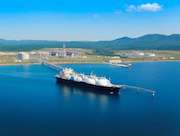The Sakhalin-1 project produces Sokol crude oil off the coast of Sakhalin Island in the Russian Far East, exporting about 273,000 barrels per day, mainly to South Korea, and to other destinations including Japan, Australia, Thailand and the United States.
Exxon said on March 1 it would exit about $4 billion in assets and discontinue all its Russia operations, including Sakhalin 1.
The oil producer is taking steps to exit Sakhalin 1, which includes addressing contractual and commercial obligations, Exxon spokesperson Julie King said in a written response.
"As operator of Sakhalin-1, we have an obligation to ensure the safety of people, protection of the environment and integrity of operations," King said.
Exxon has also significantly phased down its chemical and lubricant businesses in Russia, and suspended sales of all chemical and lubricant products into Russia and Belarus.
Project stakeholders, which also include Japan's Sakhalin Oil and Gas Development consortium and Indian explorer ONGC Videsh (ONVI.NS), are having difficulty chartering tankers to ship oil out of a region that generally needs ice vessels to navigate the journey.
That is because of growing concerns from shippers over reputation risk and the increasing difficulty for Russian assets to find insurance coverage.
"As a result, Exxon Neftegas Ltd has curtailed crude oil production," King said.
The latest tanker to take on crude at Russia's De Kastri port - where oil from Sakhalin-1 is loaded - was Aframax tanker Captain Kostichev, according to data on Refinitiv Eikon. The vessel is currently located off De Kastri port.
Two other Aframax tankers, Victor Konetsky and Yuri Senkevich, often used to ship Sokol crude to Yeosu, are empty and floating near the port as well.


